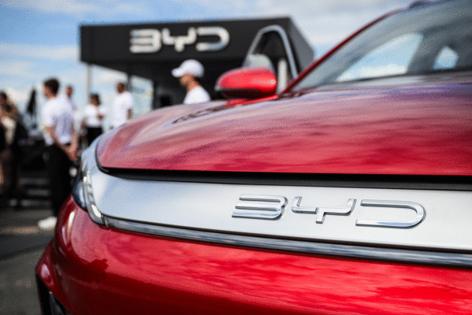Liam Denning: China's BYD cemented its lead on Tesla in five minutes
Published in Automotive News
Sometimes a chart is just a chart. Sometimes, when you’re looking at Tesla Inc. and BYD Co. Ltd. in early 2025, it’s a striking squiggly metaphor.
Tesla, the biggest U.S. electric vehicle maker, has shocked the world this year with its overt politicization and slumping sales and stock price. BYD, its great Chinese rival, just shocked the world by announcing its newest model can recharge in five minutes. The symbolism, capturing the lead that China has taken in EVs compared with a U.S. still fighting with itself about the relative wokeness of EVs, could hardly be clearer.
BYD’s boast of adding 400 kilometers (248 miles) of range to new vehicles sporting its Super-e Platform in as little as five minutes should be treated with the same caution advisable with any auto announcement. Delivering peak power of 1 megawatt would be unprecedented for passenger EVs and raises questions about the longevity of the battery and the cost of building that level of charger, including associated upgrades to the grid. On the other hand, this is no start-up scouting for funding but rather the biggest EV maker in the world, including plug-in hybrids.
Incredibly, first deliveries of BYD’s new vehicles capable of this “flash” charging are reportedly due as soon as April, which would count as flash deployment. Taken together, this would be game-changing — and not in a good way for Tesla or the rest of the U.S. automakers.
Charging an EV in a time comparable with that of visiting a gas-station would kick away an important obstacle to drivers making the switch from internal combustion engines. Not only does fast-charging dispense with having to think about how you will occupy yourself while the battery refills, it addresses range anxiety, too. If charging is as convenient as filling up, there’s even less reason to worry about getting stranded and, therefore, pay up for an oversized battery — which also has implications for critical minerals demand. BYD says it will build 4,000 megawatt-capable chargers across China.
Delivering this, and quickly, would cement China’s lead in an EV industry that had its breakout moment in the Bay Area when Tesla launched the Model S sedan a little over a decade ago. That Musk felt compelled to stage a bizarre event at the White House last week with President Donald Trump, who is no fan of EVs, apparently buying a Model S to show support says a lot about where innovation can be found these days.
Musk’s politicking damages Tesla’s brand, but the underlying problem is its relatively old line-up of models even as competitors release new ones. While Tesla abandoned plans for a cheap EV, instead launching the Cybertruck priced at six figures, BYD and its competitors churned out an array of models going for less than $30,000. As much as Tesla’s stock has fallen, it remains expensive at 84 times forward earnings, four times higher than BYD’s multiple. Tesla’s premium is now justified less by promises of growing EV sales and more by expansive, but elusive, visions of robotaxis and robots. BYD has also clouded that by releasing an advanced driver assistance system across most of its range as standard. Tesla’s, albeit more sophisticated technology, costs thousands of dollars extra for customers.
The challenge extends beyond Tesla, though. I wrote here that Big Auto as a whole faces a “made in China crisis,” and BYD’s announcement is a flashing warning of that. Perfecting flash-charging could not only accelerate EV sales in BYD’s domestic market — where two out of every three EVs are sold already — but also provide another powerful vector for Chinese auto companies to compete in or dominate markets overseas.
The U.S. has its tariffs to keep Chinese technology out, of course. Yet, these leave U.S. drivers underserved with EVs now accounting for all the growth in global auto sales, benefiting from falling battery prices and offering unquestionable advantages in efficiency and emissions. It is hard to see how better, more innovative EVs can be kept out forever. Moreover, Trump’s taste for tariffs is expansive and his threats against Canada and Mexico promise severe disruption for the likes of General Motors Co. and Ford Motor Co. Protectionism for Detroit encourages its reliance on high-priced trucks in its home market and stifles the competitive dynamic required to innovate, all while potentially ripping up its carefully constructed North American supply chain.
The U.S. industry that defined mobility for much of the 20th century sees its chance of doing the same in the 21st slipping away — and fast.
©2025 Bloomberg L.P. Visit bloomberg.com/opinion. Distributed by Tribune Content Agency, LLC.








Comments